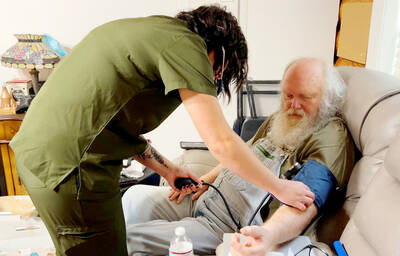Tuan Hui-min (段惠民) came across Wheat Wave Chorus (麥浪歌詠隊) while rummaging through bookshelves for something to read.
The oft-neglected story about a club founded in 1946 by students from National Taiwan University (台大, Taida) and National Taiwan Normal University (師大, Shida) immediately caught the veteran theater activist’s eye. A few months later, Choirs for Tomorrow (無路可退), Taiwan Haibizi’s (台灣海筆子) latest play, began to take shape.
“Wheat Wave Chorus consisted of Taida students arriving from China and Taiwanese students from Shida. They toured southern and central Taiwan, introducing Chinese folk songs to locals and picking up Taiwanese ballads. They were Chinese and Taiwanese who wished to break boundaries and foster mutual understanding,” said Tuan, who co-directs the play with Lin Hsin-i (林欣怡).
For the past 10 years, Taiwan Haibizi has worked in close collaboration with Japanese director and playwright Sakurai Daizo, the foremost advocate of tent-theater, a type of left-wing theater that originated in Japan in the late 1960s, a time of social unrest.
“Ten years ago when I first came to Taiwan, the relationship between the two countries [Taiwan and Japan] was post-colonial. Taiwan has entered a new phase. It is forming its viewpoints about its history and future and its relations to China, Asia and the rest of the world,” said Daizo, who now spends much of his time promoting political theater in China.
The play begins with the death of a homeless man named Lao Fei (老廢). His hobo friend A-Q (阿Q) discovers that, 60 years previously, Lao Fei was a Chinese student named Hung Shan (紅善) who was a member of Wheat Wave Chorus.
The group members’ ideals and dreams were crushed by the April 6 Incident (四六事件), when police raided the two universities. The event, which occurred in 1949, is often viewed as the beginning of the White Terror era.
“Sixty years later, we’ve lost faith and a spiritual birthplace to return to. We have to keep our eyes wide open because there is no clear path either in front or behind,” Tuan said.
Located in a parking lot adjacent to the weekend flower market at Fuhe Riverside Park in Yonghe (永和) and built by volunteers, the play’s venue is a two-story tent that contains a stage and seating. Detailed directions can be found online at blog.roodo.com/taiwanhaibizi.

When Taiwan was battered by storms this summer, the only crumb of comfort I could take was knowing that some advice I’d drafted several weeks earlier had been correct. Regarding the Southern Cross-Island Highway (南橫公路), a spectacular high-elevation route connecting Taiwan’s southwest with the country’s southeast, I’d written: “The precarious existence of this road cannot be overstated; those hoping to drive or ride all the way across should have a backup plan.” As this article was going to press, the middle section of the highway, between Meishankou (梅山口) in Kaohsiung and Siangyang (向陽) in Taitung County, was still closed to outsiders

President William Lai (賴清德) has championed Taiwan as an “AI Island” — an artificial intelligence (AI) hub powering the global tech economy. But without major shifts in talent, funding and strategic direction, this vision risks becoming a static fortress: indispensable, yet immobile and vulnerable. It’s time to reframe Taiwan’s ambition. Time to move from a resource-rich AI island to an AI Armada. Why change metaphors? Because choosing the right metaphor shapes both understanding and strategy. The “AI Island” frames our national ambition as a static fortress that, while valuable, is still vulnerable and reactive. Shifting our metaphor to an “AI Armada”

US President Donald Trump may have hoped for an impromptu talk with his old friend Kim Jong-un during a recent trip to Asia, but analysts say the increasingly emboldened North Korean despot had few good reasons to join the photo-op. Trump sent repeated overtures to Kim during his barnstorming tour of Asia, saying he was “100 percent” open to a meeting and even bucking decades of US policy by conceding that North Korea was “sort of a nuclear power.” But Pyongyang kept mum on the invitation, instead firing off missiles and sending its foreign minister to Russia and Belarus, with whom it

The older you get, and the more obsessed with your health, the more it feels as if life comes down to numbers: how many more years you can expect; your lean body mass; your percentage of visceral fat; how dense your bones are; how many kilos you can squat; how long you can deadhang; how often you still do it; your levels of LDL and HDL cholesterol; your resting heart rate; your overnight blood oxygen level; how quickly you can run; how many steps you do in a day; how many hours you sleep; how fast you are shrinking; how